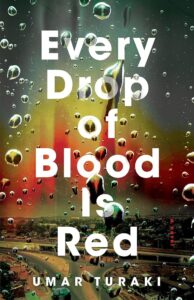Quandaries amid crises
Every Drop of Blood Is Red
by Umar Turaki
New York: Little A (an Amazon imprint), 2024
$24.99 / 781662508110
Reviewed by Jessica Poon
*

Every Drop of Blood Is Red, the second novel by Kelowna resident Umar Turaki, begins in medias res, with an unnamed man eating almost two slices of cake. He doesn’t know where his wife is, picks up a lamp, and abruptly smashes the cake. A beautiful, delicious cake now “looks like a building whose top two floors have been bombed.” A mess, in other words. Atmospherically, it’s reminiscent of a thriller from the purview of a serial killer. The cake is cleaned up off-camera, so to speak. Without knowing much about the unnamed man, it’s easy to see the cake as allegory for a formerly ideal life.
The unnamed, cake-smashing man is Dareng Pamson, a successful, if not maximally profit-oriented mechanic in Jos, Nigeria. After Pamson’s high-earning wife, Rahila, becomes unexpectedly pregnant in her mid-forties and discovers his infidelity with a woman named Mary, their marriage, strained by reversed gender dynamics already, becomes fraught, possibly irrevocably.
But then Pamson comes up with an idea—to enrol in a weekly baking class to learn how to make Rahila’s favorite pastries. As the novel explains: “The connection between a man’s heart and his stomach has been pointed out too often, but perhaps it is also true for women. Perhaps is true for all people. He decides to enroll with a single aim: to win her back by going through her stomach.”
As far as currying favour with rightfully angry spouses goes, it’s not the worst idea.
Pamson’s life changes when Murmula, a young Muslim woman who insists on her love of cars, makes a plea to become an apprentice at Pamson’s auto shop. Fearing Rahila’s suspicions of further infidelity, Pamson says no, but Rahila later convinces Pamson to hire Murmula as a receptionist. Unbeknownst to Pamson, Murmula, an orphan living with her aunt and uncle, seeks retribution for Pamson stealing her deceased father’s land. Thickening the plot still further is Rahila’s cousin, Paul, who is immediately besotted with Murmula and has a predilection for puns, one that Murmula finds winsome. To Murmula’s surprise, she reciprocates his feelings. Paul, however, is not the only one who finds Murmula’s attractive—so does her cousin, Musty, though this is only ever addressed minimally.
At Murmula’s suggestion, Paul becomes Pamson’s business manager. Rahila points out all of Paul’s recommendations are actually suggestions that Rahila made in the past. Pamson, criticized by Rahila for not being more strategic with capitalistic gains, finds himself seduced by the idea of more. Pamson wants to regain Rahila’s trust, which means learning how to make the perfect cake and becoming more rapacious for money and status.

Paul wants Murmula to be his girlfriend. Murmula likes Paul, but has been in love with the notion of revenge for longer. But how far will Murmula go in enacting her revenge and what unforeseen consequences will there be as a result? How, if at all, will her enmeshments with Rahila and Paul affect her decision making? Is there such a thing as karmic retribution, or true forgiveness?
By the fifteenth chapter, something calamitous and inexplicable—and it is left unexplained—affects the lives of all the major characters. In a work of genre fiction, there would probably be an explanation; here, the calamitous event functions to activate even more self-introspection and self-doubt for Pamson and Murmula.
In one scene with a reverend, Pamson says, after repetitive prodding, “There’s nothing good about the world.” In another scene, Pamson goes to confession, though he is not Catholic. The priest says, “God is dead to me. I wish I could tell all those people waiting to come in that this is a waste of time. But I have to keep on doing it because I need to survive. None of it matters. … Don’t waste your time worrying about your conscience. Nobody is going to judge us or save us.” Later, after a confrontation with a man from his past, Pamson decides to go to church. Crises of faith are prominent. The inexplicable remains inexplicable. Turaki (Such a Beautiful Thing to Behold) invokes rain often. The lone sex scene is more awkward than erotic, relying on the metonymy of him in favour of being more explicit, e.g. “Her hand came out filled with all of him.”
Every Drop of Blood Is Red has enough tangly relationships for a soap opera, ample tension for a psychological thriller, and meaningful, if slightly under-explored sociopolitical commentary on race, religion, and gender. Turaki, also a filmmaker, writes cinematically and without pretension; you see everything he writes. His observations of condensed chaos lack tidy resolutions, much like life.

*

Originally from East Vancouver, Jessica Poon is a writer, former line cook, and pianist of dubious merit who recently returned to BC after completing a MFA in Creative Writing at the University of Guelph. [Editor’s note: Jessica Poon has reviewed books by Katrina Kwan, Jane Boon, Terese Svoboda, Maia Caron, Wendy H. Wong, Andromeda Romano-Lax, Sarah Leipciger, Katrina Kwan, Shelley Wood, Richard Kelly Kemick, Elisabeth Eaves, Rajinderpal S. Pal, Keziah Weir, Amber Cowie, Robyn Harding, Roz Nay, Anne Fleming, Miriam Lacroix, Taslim Burkowicz, Sam Wiebe, Amy Mattes, Louis Druehl, Sheung-King, Loghan Paylor, Lisa Moore (ed.), Sandra Kelly, and Robyn Harding for BCR]
*
The British Columbia Review
Interim Editors, 2023-25: Trevor Marc Hughes (non-fiction), Brett Josef Grubisic (fiction and poetry)
Publisher: Richard Mackie
Formerly The Ormsby Review, The British Columbia Review is an online book review and journal service for BC writers and readers. The Advisory Board now consists of Jean Barman, Wade Davis, Robin Fisher, Barry Gough, Hugh Johnston, Kathy Mezei, Patricia Roy, and Graeme Wynn. Provincial Government Patron (since September 2018): Creative BC. Honorary Patron: Yosef Wosk. Scholarly Patron: SFU Graduate Liberal Studies. The British Columbia Review was founded in 2016 by Richard Mackie and Alan Twigg.
“Only connect.” – E.M. Forster
2 comments on “Quandaries amid crises”